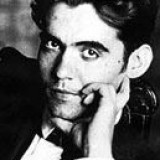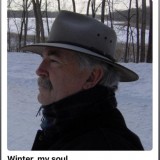What about poetry??
-
ddavidd
11 years ago"Music Is what feelings sound like"
I read this somewhere in Facebook quoted from some of those new age wizards
this was my two cents ::
very nice but not accurate!! for example what about poetry?? When we give definition to something that cannot be defined definitely, we only limit our vision, our wisdom. We become like the little tramp ((Charles Chaplin)) who in a clip, shoved all his clothes in a suitcase and closed it, then grabbed a scissor and cut whatever was sticking out!!
That suitcase is our boxes. -
ddavidd
11 years agoIs it music or poetry::
https://www.youtube.com/watch?feature=player_embedded&v=9Pes54J8PVw#! -
L
11 years agoBoth,
Music is poetry, poetry is music. It depends on the writer and the intention of the writer. What the writer aims to do. -
Larry Chamberlin
11 years agoThe song in my heart finds words to be a poor medium of expression, but without any viable alternatives it sings out its heart.
-
Jordan
11 years agoMusic and poetry aren't mutually exclusive.
-
ddavidd
11 years agoMutual in what??
and exclusion from what ??
or mutual in what exclusion??
hope the "syntheses" be found someday!! -
Decayed
11 years agoI think poetry is music. An inner one.
-
Larry Chamberlin
11 years ago"Music Is what feelings sound like" - Selena Gomez
"very nice but not accurate!! for example what about poetry?? When we give definition to something that cannot be defined definitely, we only limit our vision, our wisdom. We become like the little tramp ((Charles Chaplin)) who in a clip, shoved all his clothes in a suitcase and closed it, then grabbed a scissor and cut whatever was sticking out!!
That suitcase is our boxes." - Ddavidd
I agree with both statements; think this through with me as I attempt it.
Strictly speaking music as opposed to poetry can be of two Types: instrumental or song. Song itself can be accompanied or a Capella.
Taking Ddavidd's original quote attributed to Gomez, it is agreeable that without words music usually has a more direct impact on emotions than on thoughts. There are certain musical works that attempt to engage thoughts and they are sometimes preceded by explanations to attune the listener to particular passages as symbols. Take Peter & the Wolf by Sergei Prokofiev; it is a composition written for children intended to tell a story. Each character in the work is represented by a different tune, as explained ahead of time, and the narrator tells the story. As the various tunes interact with each other in dramatic fashion we can picture the adventure for ourselves. However, without the narrative code to explain the parts to us, the story would not be cohesive. We would each associate the tunes in whatever fashion we imagine and there would not be the charming story Prokofiev intended.
Thus, music by itself may give rise to thoughts and reason, but there is no common musical language as such. Instead, composers worldwide have developed exquisite compositions that speak directly to our emotions. Listen to Beethoven's Piano Sonata No. 14 (the "Moonlight Sonata") and then to Mozart's Serenade in G major, K. 525 (Eine kleine Nachtmusik: A Little Night Music) and you will have decidedly different emotional reactions. The Sonata is pastoral, ominous and somber, while the Serenade is light hearted, flirtatious and lively. In this sense music arguably captures the feelings beautifully.
Now what of words? Poetry and song often have that same purpose found with music: to represent emotions in deep and profound manners. Now, though, something else is added. By expressing the meaning of emotions the emotions can be more directly addressed, both specifically and more exclusively. We use emotional terms and juxtapose words to capture their connotations as well as their denotations. The poet, like the songwriter, has a language common to his intended audience to get his point communicated - to express the emotional content he wishes. However, as Gloria Estefan says, "words get in the way." The very use of language to communicate emotion entangles the message with the process of reason, both in the selection of specific words by the author and in the interpretation of these words by the reader. The basic fact is that reason can never fully comprehend emotion, so the ultimate message is doomed to imperfection. This clouding of the emotions by setting it through the filter of reason is Charlie Chaplin cutting off the clothes that do not fit in the suitcase. -
Jordan
11 years agoI'm not gonna lie, I'm not really sure why I said that in my last post. I was tired, at work late without a keyboard, and trying to find a single phrase to describe how I felt (and the wrong one at that!)
I'll get back to this. -
ddavidd
11 years agoDon't worry that happens to me all the times.
Adolf Hitler said that it is harder to convince an intellectual than a whole nation, but our case is opposite Larry. your comprehensions makes me feel at home. -
Michael D Nalley
11 years agoHow many times have you listened to a song or read a poem and was sucked in by one line . Thenall the other lines became metaphors for general feelings you have . Years ago I played a recording of a song that I was lead to believe was written about a poet I spent a lot of time with
thogh he did not find the one I was looking for he found one that managed to invoke a lot of emotion in me that I felt the lyrics could stand on their own http://youtu.be/veXGiU5XNFQ my attachment to these lyrics have no real basis in logic





